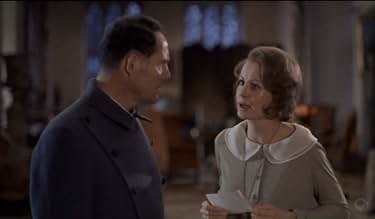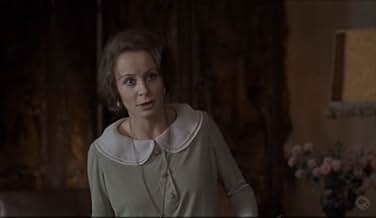अपनी भाषा में प्लॉट जोड़ेंA young British woman suffering from depression over the loss of her husband develops an unusual relationship with her chauffeur.A young British woman suffering from depression over the loss of her husband develops an unusual relationship with her chauffeur.A young British woman suffering from depression over the loss of her husband develops an unusual relationship with her chauffeur.
- 3 BAFTA अवार्ड जीते गए
- कुल 6 जीत
Anna Barry
- Dinner Party Guest
- (बिना क्रेडिट के)
Richard Burrell
- Dinner Party Guest
- (बिना क्रेडिट के)
George Hilsdon
- Perkins
- (बिना क्रेडिट के)
Eric Kent
- Man Going Into Building
- (बिना क्रेडिट के)
Don McKillop
- Boxing Match MC
- (बिना क्रेडिट के)
फ़ीचर्ड समीक्षाएं
If you have enjoyed the original Hartley book with its subtleties and irony, then this film is going to be a big disappointment. Although the pace and direction of the screenplay are broadly the same, some of the characters are missing and others have extended roles. The revised finale completely loses the harrowing irony and pathos of the book. Ripe for a Merchant/Ivory production...
Thoughtful study of the British class system, told from the perspective of one who essentially occupies its bowels, a chauffeur (Shaw) interacting with his employer (Miles), forming a close bond that threatens to transcend societal boundaries. Unfortunately for Shaw, his vulnerabilities mutate into misplaced fondness for Miles, a mentally crippled lady of standing whose only capable affections are for a recently returned war veteran (Egan).
Slow moving, talky and ultimately (in my opinion) a bit aimless - the climax is much anticipated, but the film ends quite abruptly and doesn't seem to me to do the narrative justice. Having not read the book, perhaps director Bridges was somewhat constrained by the manacles of the source material.
Performances are of the calibre that LP Hartley fans came to expect following "The Go Between" in 1971, "The Hireling" should appeal to anyone whose interested in human drama, or perhaps, who admires the work of Shaw or Miles. Both are very realistic in their extremes, and of course, poignantly, in their common frailties. More narrative structure would have suited me better, even so, it's a sophisticated drama worth a look.
Slow moving, talky and ultimately (in my opinion) a bit aimless - the climax is much anticipated, but the film ends quite abruptly and doesn't seem to me to do the narrative justice. Having not read the book, perhaps director Bridges was somewhat constrained by the manacles of the source material.
Performances are of the calibre that LP Hartley fans came to expect following "The Go Between" in 1971, "The Hireling" should appeal to anyone whose interested in human drama, or perhaps, who admires the work of Shaw or Miles. Both are very realistic in their extremes, and of course, poignantly, in their common frailties. More narrative structure would have suited me better, even so, it's a sophisticated drama worth a look.
A British drama; A story about an upper-class widow suffering from depression over the loss of her husband, who develops an unusual relationship with her chauffeur. This is an adaptation of L.P. Hartley's novel. It has a measured pace and a care for the telling detail. It shows the vast barrier between social classes, suppressed sexuality, and of a casualness. One side is cold, yearning for warmth; the other, striving but painfully frustrated yet they give one another the confidence one grants a stranger. Robert Shaw is remarkable as the chauffeur, an ex-sergeant major, ramrod straight, filled with a sense of class and keeping his place. Sara Miles's aristocrat is equally well drawn as the widow, childless, on release from a sanitarium. Their scenes are marked by intriguing sequences: long, uninterrupted car rides through an overcast, rainy Somerset. The work up to the final scenes is gentle and slowly paced to maximise tension. This is a film very well directed, earning the Palme d'Or in 1973.
Another of L.P. Hartley's tales of class and sexual obsession, this one was brought to the screen in 1973 by Alan Bridges, who also made "The Shooting Party", and despite winning three BAFTAs and the Palme D'Or at Cannes has all but disappeared. Like "The Go-Between" this, too, is about a relationship that develops between a titled lady, (Sarah Miles), and a member of the working class, (Robert Shaw), but unlike "The Go-Between", this is a somewhat small-scale affair though psychologically it is just as astute.
It is set in the years after the First World War and Miles is the young widow recovering from a nervous breakdown after the death of her husband and Shaw is the man hired to drive her around and who develops an unhealthy obsession with his employer and they are both superb. The fine supporting cast includes a young Peter Egan as a smug Liberal Member of Parliament and Elizabeth Sellars as Miles' chilly mother while the screenplay by Wolf Mankowitz is typically literate. In fact, you might describe the film itself as chilly. It is certainly old-fashioned but with a degree of frankness that would have been unheard of 20 years earlier and it deserves to be seen.
It is set in the years after the First World War and Miles is the young widow recovering from a nervous breakdown after the death of her husband and Shaw is the man hired to drive her around and who develops an unhealthy obsession with his employer and they are both superb. The fine supporting cast includes a young Peter Egan as a smug Liberal Member of Parliament and Elizabeth Sellars as Miles' chilly mother while the screenplay by Wolf Mankowitz is typically literate. In fact, you might describe the film itself as chilly. It is certainly old-fashioned but with a degree of frankness that would have been unheard of 20 years earlier and it deserves to be seen.
This is a thoughtful film that lays bare the inequities of the so-called upper class and those who work for them, the haves and have-nots. Robert Shaw does a creditable job in his role as the obliging, correct chauffeur, Steven Ledbetter, who helps Lady Franklin (Sarah Miles) overcome her mental depression at the outset. However, Steven has many mixed feelings regarding this lady of the upper class. He inevitably falls in love with her, which of course is overstepping the societal boundaries that separate them.
I have not read anything prior to this and only judge the movie as I have seen it. I consider it a very honest story about the realities of daily living and the conflict of what we might wish or expect from life and what we get. It's a fine drama worth seeing again.
I have not read anything prior to this and only judge the movie as I have seen it. I consider it a very honest story about the realities of daily living and the conflict of what we might wish or expect from life and what we get. It's a fine drama worth seeing again.
क्या आपको पता है
- ट्रिवियाThe film was entered and selected to screen in competition at the Cannes Film Festival in 1973 where the picture won in a tie the prestigious Palme d'Or (The Golden Palm) award shared with Jerry Schatzberg's Scarecrow (1973).
- भाव
Lady Franklin: [Asking Hugh about his wartime experiences] Was it very bad?
Captain Hugh Cantrip: [There is a telling silence: we cannot see his expression because of the shadows]
Lady Franklin: Well, you're back now.
Captain Hugh Cantrip: [as light and shadow flicker across his face] Am I? Sometimes I wonder...
- कनेक्शनFeatured in Sven Uslings Bio: The Hireling (2020)
टॉप पसंद
रेटिंग देने के लिए साइन-इन करें और वैयक्तिकृत सुझावों के लिए वॉचलिस्ट करें
- How long is The Hireling?Alexa द्वारा संचालित
विवरण
- रिलीज़ की तारीख़
- कंट्री ऑफ़ ओरिजिन
- भाषा
- इस रूप में भी जाना जाता है
- Botschaft für Lady Franklin
- फ़िल्माने की जगहें
- उत्पादन कंपनियां
- IMDbPro पर और कंपनी क्रेडिट देखें
इस पेज में योगदान दें
किसी बदलाव का सुझाव दें या अनुपलब्ध कॉन्टेंट जोड़ें




























